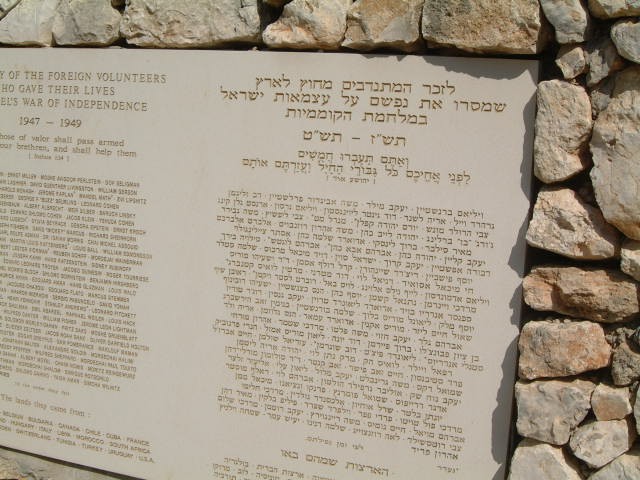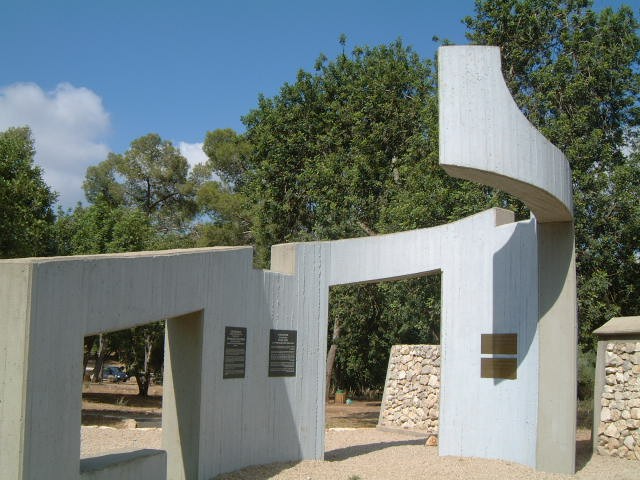The French Commando
Hagdud Hatzarfati (the French Speaking Battalion), battalion number 75, was assembled under the command of Major Tedi Eithan (formerly Tadé Diper) at the beginning of August, 1948. The battalion was dispersed by the middle of September 1948. The Negev Brigade was at the time in the midst of its preparations for Operation Yoav; thus two of the battalion's companies were annexed to the Second Battalion, and another one to the Ninth Battalion.
Hagdud Hatzarfati was assembled under the command of Major Tedi Eithan (formerly Tadé Diper) at the beginning of August. 1948. Tedi was a Catholic French volunteer, formerly a Captain in the Free French Forces of the Second World War. The attempt to assemble a battalion of French speakers did not succeed, and the battalion was dispersed in the middle of September 1948. Two of its companies were annexed to the Second Battalion, which had just been transferred from the Negev Brigade to the Yiftach Brigade, and one company, under the command of Tedi Eithan, was sent to a camp in Caesarea to train in minor tactics warfare and amphibious landing of forces in preparation for a mission which was to be part of Operation Yoav. The mission which involved amphibious landing of forces was cancelled and while the Negev Brigade was in the midst of its preparations for Operation Yoav, it was decided in the Palmach headquarters that the company be annexed to the Ninth Battalion. The company comprised of a hundred warriors, among them Jewish volunteers from North Africa, as well as Jewish and non-Jewish volunteers who served in the Free French Forces and in the Anti-Nazi undergrounds during the Second World War. Eli Overlander, a senior Palmach member returning from a mission in the French training camps, was appointed Tedi’s deputy.
When the company joined the Ninth Battalion, its men were divided into two platoons comprising of four commando crews, which in turn comprised of seven fighters each. Trained and experienced officers (some of them sergeants) were appointed as commanders of the divisions and crews. Operation Yoav was the first fight in which the French Commando participated. Their mission, as part of the Ninth Battalion, was to attack an Egyptian camp situated near Rafah and to mine the road intersection Rafah – Auja – El Hafir - El Aris. The company's deputy commander, Eli Overlander, lost his life in the second attack which took place on the night of the 18th of October, and the scout Ya'akov Braha, member of Kibbutz Nirim, was declared missing.
As the operation continued and the Negev Brigade attacked Bee’r Sheva as part of Operation Moshe, the French Commando was assigned to break in to the city and purge the constructed terrain. The company suffered twenty casualties; four fighters, Rafae’l Wiler, Moshe Vise, Abraham Zarbiv and Jack Shulman, two of whom were commanders, lost their lives. A few days after the city was conquered, Marek Levi (member of the Jewish French underground A.J of the Second World War), was killed on his way to prepare the company's training field, when his jeep ran over a mine.
When the Negev Brigade established itself in Bee’r Sheva, the French Commando Company separated from the Ninth Battalion and became an independent unit, while Tedi Eithan joined the battalion’s commanders in the Brigade's headquarters. During November and December 1948, the unit was engaged with different aspects of the safe guarding of the Negev strip borders, such as the mining of traffic routes and setting up ambushes.
On the 25th of December 1948, Operation Horev began. The French Commando Unit, under the command of the Seventh Battalion, conquered position 14 in the Thamile fighting zone. Multiple Egyptian counter attacks, injuring more than half its fighters, wore out the unit's resistance. Tedi Eithan, despite his wounded leg, continued to lead his men, but after six hours of fighting the commander of the Seventh Battalion gave the order to retreat. Twenty three men were injured in the attack. Nine men, four of whom were commanders, were killed. Their names are: Reuven Steinhof, Israel (Andre) Halimi, Edgar Dreyfus, Mordehai Halimi, Sharl Ochaiun, Jerman Eruet, Mordehai Twito, Fredi Peper and Alex Golden. The unit lost its ability to fight and returned to its camp in Bee’r Sheva. The dead were buried in the temporary graveyard near Kibbutz Revivim and the injured were evacuated to the hospitals.
The unit held on for several months more, until it was dispersed on March, 1949. Many of its fighters returned to their homelands and a few settled in Israel. Tedi Eithan completed his service in the Israeli Defense Forces and returned to France. A few days before his departure, he received a letter from the Ramatcal (the commander in chief of the Israeli Army), Ya'akov Dori, in which he wrote, "Please accept my sincere esteem for the leadership you've exemplified in impressive combat operations. Deliver my appreciation for the bravery your men demonstrated in the battlefields".
When the company joined the Ninth Battalion, its men were divided into two platoons comprising of four commando crews, which in turn comprised of seven fighters each. Trained and experienced officers (some of them sergeants) were appointed as commanders of the divisions and crews. Operation Yoav was the first fight in which the French Commando participated. Their mission, as part of the Ninth Battalion, was to attack an Egyptian camp situated near Rafah and to mine the road intersection Rafah – Auja – El Hafir - El Aris. The company's deputy commander, Eli Overlander, lost his life in the second attack which took place on the night of the 18th of October, and the scout Ya'akov Braha, member of Kibbutz Nirim, was declared missing.
As the operation continued and the Negev Brigade attacked Bee’r Sheva as part of Operation Moshe, the French Commando was assigned to break in to the city and purge the constructed terrain. The company suffered twenty casualties; four fighters, Rafae’l Wiler, Moshe Vise, Abraham Zarbiv and Jack Shulman, two of whom were commanders, lost their lives. A few days after the city was conquered, Marek Levi (member of the Jewish French underground A.J of the Second World War), was killed on his way to prepare the company's training field, when his jeep ran over a mine.
When the Negev Brigade established itself in Bee’r Sheva, the French Commando Company separated from the Ninth Battalion and became an independent unit, while Tedi Eithan joined the battalion’s commanders in the Brigade's headquarters. During November and December 1948, the unit was engaged with different aspects of the safe guarding of the Negev strip borders, such as the mining of traffic routes and setting up ambushes.
On the 25th of December 1948, Operation Horev began. The French Commando Unit, under the command of the Seventh Battalion, conquered position 14 in the Thamile fighting zone. Multiple Egyptian counter attacks, injuring more than half its fighters, wore out the unit's resistance. Tedi Eithan, despite his wounded leg, continued to lead his men, but after six hours of fighting the commander of the Seventh Battalion gave the order to retreat. Twenty three men were injured in the attack. Nine men, four of whom were commanders, were killed. Their names are: Reuven Steinhof, Israel (Andre) Halimi, Edgar Dreyfus, Mordehai Halimi, Sharl Ochaiun, Jerman Eruet, Mordehai Twito, Fredi Peper and Alex Golden. The unit lost its ability to fight and returned to its camp in Bee’r Sheva. The dead were buried in the temporary graveyard near Kibbutz Revivim and the injured were evacuated to the hospitals.
The unit held on for several months more, until it was dispersed on March, 1949. Many of its fighters returned to their homelands and a few settled in Israel. Tedi Eithan completed his service in the Israeli Defense Forces and returned to France. A few days before his departure, he received a letter from the Ramatcal (the commander in chief of the Israeli Army), Ya'akov Dori, in which he wrote, "Please accept my sincere esteem for the leadership you've exemplified in impressive combat operations. Deliver my appreciation for the bravery your men demonstrated in the battlefields".


